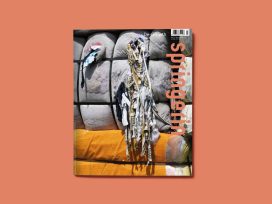Editorial "Springerin" 1/2005
The first issue of this magazine appeared in April 1995, then still under the name of springer – Hefte für Gegenwartskunst. The picture of a chameleon featured on the cover intimated the versatility that was to be demonstrated in the forty issues that followed. Before the retrospective gaze unfolds a long, varied journey characterized by the constant endeavour to open up new themes and geographical focuses.
For our tenth anniversary, we do not so much want to review the past as to try, in keeping with this maxim, to open up yet more vistas, examining current developments, still untried paths, and the constantly renegotiable status of critical art and its discourses.
One focus is on the promises and prophecies of digital culture, which ten years ago was still in its youth. The Net segment in this issue therefore looks at a number of predictions made at the time heralding the “new”, and enquires after their concrete fulfilment. Links between the past and the present are, however, to be found not only in earlier utopian concepts of network and artificiality, but also in local multimedia scenes, which, after several decades, have suddenly regained their relevance for the here and now.
The current issue is also devoted to a number of artists who have so far been little regarded or even largely forgotten, but who embody a moment of “Past Forward”. On the one hand, this means long careers like that of Ion Grigorescu, who since the early 1970s has consistently engaged with both the intransigencies and the political and cultural changes in his local environment. On the other, there are approaches like that of Eustach Kossakowski, who entered the history of conceptual photography early on, without its having been accepted into the conventional canon; or the paintings of the film theorist Manny Farber, whose film-influenced still lifes are also waiting for rediscovery.
Another focus in this issue is the present state of the cultural studies discourse. For example, Raymond Williams’ pioneering glossary, “Keywords”, has recently been revised for present-day needs; you can read some exclusive excerpts here. And Lawrence Grossberg analyzes the current radical changes in US politics from the point of view of cultural theory. All of this is not just a “Past Forward” in the critically sharpened sense, but about more openings: work on what has been repressed, work on what is yet to come.
Published 10 June 2005
Original in German
Contributed by Springerin © Springerin Eurozine
PDF/PRINTNewsletter
Subscribe to know what’s worth thinking about.



